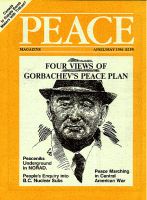
Peace Magazine Apr-May 1986, page 15. Some rights reserved.
Search for other articles by Matthew Behrens here
On June 27, 1983, a complaint and summons were served against 28 nations which owned or had the capabillty of producing nuclear weapons. The plaintiffs in this case were simply "people of the earth," and their case would be heard in the First Provisional District World Court in Los Angeles.
The court, an outgrowth of the Federation of Earth's Provisional World Parliament, was established Through The use of numerous precedents, including the Nuremberg War Crimes Tribunal and the Bertrand Russell Stockholm Tribunal. Those precedents were, however, ad hoc in nature, whereas the Provisional World Courts are organized within The context of a Constitution for World Federation and an evolving World Parliament. Among the world figures included as honorary sponsors are Dr. Linus Pauling, former U.S. Attorney General Ramsay Clark, South African poet Dennis Brutus, and Canadians Norman Alcock and George Ignatieff.
Leon Vickmann, a Fulbright scholar and Los Angeles attorney and a member of the Lawyers Alliance for Nuclear Arms Control, brought the case to court loaded with documentation on the illegality of nuclear weapons. "Far from being an isolated action, The suit we have entered is only the first of many which may be taken before the Provisional District World Courts to defend the rights of humanity," he said.
With hearings scheduled for some time later this year, Vickmann's case comes at a time when the efficacy of existing world legal bodies is in question. The notion of a new court coincides with the precedent-setting U.S. contempt of the International Court of Justice (ICJ) at The Hague. In the latter case, Nicaragua sued the U.S. for damages inflicted through countless illegal acts-including the mining of harbors and funding of contra mercenaries-but the U.S. refused the ICJ's jurisdiction.
"There is now a major void in the law, and people should be allowed to go somewhere to tell these nations that nuclear weapons endanger the planet," Vickmann believes. He first came to the case in 1981 after hearing Helen Caldicott, which prompted him to wonder what he as an individual could do. He then concluded, "lawyers are trained to sue."
Though he receives much support, Vickmann hears on occasion the inevitable comment from a tired, disillusioned activist that his case is somehow naive. 'When people ask if it's utopian to think of world courts serving the cause of peace, I reply right back that it's utopian to deny the existence of nuclear weapons. If present law cannot deal with this issue, then what good is the law? One of the last things we have as civilized people is the law, and perhaps we can use it to eliminate potential violence," he concluded. "Since we are strictly following all generally accepted legal procedures in this suit, we are confident that its impact on the legal community and the planet in general will be significant."
For more information, write to Leon Vickmann at 16255 Ventura Blvd., Suite 605, Encino, California 91436.

Peace Magazine Apr-May 1986, page 15. Some rights reserved.
Search for other articles by Matthew Behrens here